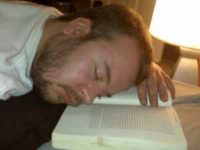Author Interviews, BMJ, Circadian Rhythm, JAMA, Occupational Health / 27.02.2021
Morning Larks More Productive at Work and Have Fewer Disability Pensions
MedicalResearch.com Interview with:
Dr Tapio Räihä
Center for Life Course Health Research
University of Oulu, Oulu, Finland
MedicalResearch.com: What is the background for this study?
 Response: In ageing societies, understanding risk factors for pre-term disability pensions and poor work ability is an important research priority. We studied whether individual-level chronotype could contribute to these. Previous research has shown that evening chronotypes (E-types) have poorer health compared with morning chronotypes (M-types), and that E-types may have difficulties to function during standard morning working hours. This study was the first population-level study with register linkage to find out whether eveningness would be associated with poor work ability and disability pensions, too.
We surveyed chronotype (with the Morningness–Eveningness Questionnaire) among 5831 non-retired Finns born in 1966 when they were at age 46 years, and compared it with their current perceived work ability. We then followed the emergence of new registered disability pensions during the next 4 years. Multivariate logistic and Cox regression analyses of the associations between chronotype and the outcomes were separately adjusted for sleep, health and behaviours, sociodemographic and economic factors, or working times (more…)
Response: In ageing societies, understanding risk factors for pre-term disability pensions and poor work ability is an important research priority. We studied whether individual-level chronotype could contribute to these. Previous research has shown that evening chronotypes (E-types) have poorer health compared with morning chronotypes (M-types), and that E-types may have difficulties to function during standard morning working hours. This study was the first population-level study with register linkage to find out whether eveningness would be associated with poor work ability and disability pensions, too.
We surveyed chronotype (with the Morningness–Eveningness Questionnaire) among 5831 non-retired Finns born in 1966 when they were at age 46 years, and compared it with their current perceived work ability. We then followed the emergence of new registered disability pensions during the next 4 years. Multivariate logistic and Cox regression analyses of the associations between chronotype and the outcomes were separately adjusted for sleep, health and behaviours, sociodemographic and economic factors, or working times (more…)
 Response: In ageing societies, understanding risk factors for pre-term disability pensions and poor work ability is an important research priority. We studied whether individual-level chronotype could contribute to these. Previous research has shown that evening chronotypes (E-types) have poorer health compared with morning chronotypes (M-types), and that E-types may have difficulties to function during standard morning working hours. This study was the first population-level study with register linkage to find out whether eveningness would be associated with poor work ability and disability pensions, too.
We surveyed chronotype (with the Morningness–Eveningness Questionnaire) among 5831 non-retired Finns born in 1966 when they were at age 46 years, and compared it with their current perceived work ability. We then followed the emergence of new registered disability pensions during the next 4 years. Multivariate logistic and Cox regression analyses of the associations between chronotype and the outcomes were separately adjusted for sleep, health and behaviours, sociodemographic and economic factors, or working times (more…)
Response: In ageing societies, understanding risk factors for pre-term disability pensions and poor work ability is an important research priority. We studied whether individual-level chronotype could contribute to these. Previous research has shown that evening chronotypes (E-types) have poorer health compared with morning chronotypes (M-types), and that E-types may have difficulties to function during standard morning working hours. This study was the first population-level study with register linkage to find out whether eveningness would be associated with poor work ability and disability pensions, too.
We surveyed chronotype (with the Morningness–Eveningness Questionnaire) among 5831 non-retired Finns born in 1966 when they were at age 46 years, and compared it with their current perceived work ability. We then followed the emergence of new registered disability pensions during the next 4 years. Multivariate logistic and Cox regression analyses of the associations between chronotype and the outcomes were separately adjusted for sleep, health and behaviours, sociodemographic and economic factors, or working times (more…)

